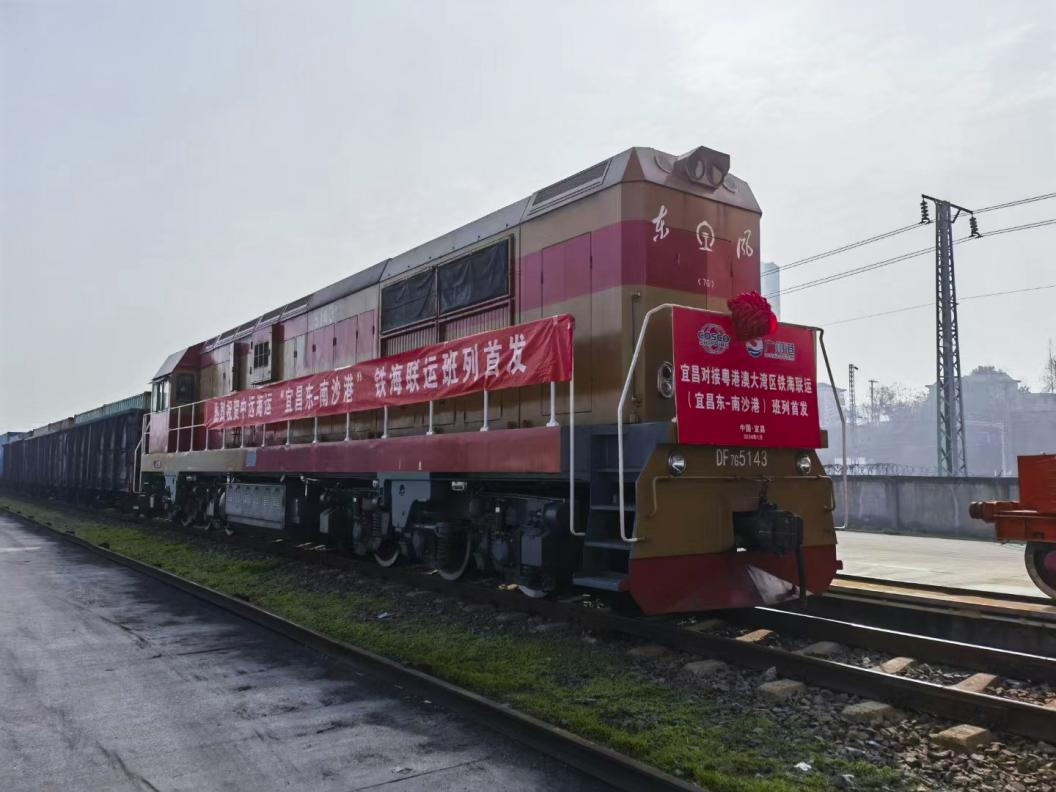Yichang opens new freight route to Southeast Asia
2024-01-09 20:01:00
By Yan Wanqin, Yichang International Communication Studio
At 10 am on January 5, a freight train loaded with 19 carriages of chemical products departed from Yichang East Railway Station. The cargo was set for Nansha Port in Guangzhou City where it would then be shipped to Indonesia, Thailand, India and other countries.
 A train serving the Yichang-Guangzhou rail-sea intermodal line departs from Yichang East Railway Station. Photo by Xia Tao.
A train serving the Yichang-Guangzhou rail-sea intermodal line departs from Yichang East Railway Station. Photo by Xia Tao.
Nansha Port, a major part of Guangzhou Port, opened over 150 international freighter routes, connecting with more than 400 ports across more than 100 countries and regions.
The operation of the new train route not only helps cut time, but also costs.
It used to take about 25 days to deliver the goods prior to this route due to them being first sent to Shanghai via the Yangtze River where they would then be exported to countries in Southeast Asia. That route - slow by today's standards - is also affected by seasonal conditions on the river.
With rail-sea intermodal transportation now available, it takes an average of only 10 days, less than half the time of the previous maritime route.
"At present, we plan to operate one train per week. In the future, as demand increases, we can operate three to four trains a week, or even one train every day," said Liu Heshun, deputy general manager of Guangzhou Port Logistics Co., Ltd.
In 2023, Yichang opened three rail-sea intermodal trains, i.e. Yichang-Qinzhou (for ASEAN), Yichang-Xiamen (for Europe, Japan and South Korea) and Yichang-Ningbo (all over the world). The city also opened the new river-rail-sea line via Yichang-Chongqing-Qinzhou, and a freight train via Yichang-Laos.
Together with the regular river-sea transportation channel and the China-Europe Express trains, Yichang is becoming a prime transportation hub. The city will continue to leverage this positioning to boost its economic growth.
Yichang's new freight route with Guangzhou will help foreign trade enterprises consolidate their share in Southeast Asia and expand their presence in the African market.
In the future, this new route will serve as an important channel for key enterprises throughout the city. More products from Yichang, such as canned food, ceramic sanitary ware, and even cars, will find their way to the world through the southbound transportation channel.
At 10 am on January 5, a freight train loaded with 19 carriages of chemical products departed from Yichang East Railway Station. The cargo was set for Nansha Port in Guangzhou City where it would then be shipped to Indonesia, Thailand, India and other countries.
 A train serving the Yichang-Guangzhou rail-sea intermodal line departs from Yichang East Railway Station. Photo by Xia Tao.
A train serving the Yichang-Guangzhou rail-sea intermodal line departs from Yichang East Railway Station. Photo by Xia Tao.Nansha Port, a major part of Guangzhou Port, opened over 150 international freighter routes, connecting with more than 400 ports across more than 100 countries and regions.
The operation of the new train route not only helps cut time, but also costs.
It used to take about 25 days to deliver the goods prior to this route due to them being first sent to Shanghai via the Yangtze River where they would then be exported to countries in Southeast Asia. That route - slow by today's standards - is also affected by seasonal conditions on the river.
With rail-sea intermodal transportation now available, it takes an average of only 10 days, less than half the time of the previous maritime route.
"At present, we plan to operate one train per week. In the future, as demand increases, we can operate three to four trains a week, or even one train every day," said Liu Heshun, deputy general manager of Guangzhou Port Logistics Co., Ltd.
In 2023, Yichang opened three rail-sea intermodal trains, i.e. Yichang-Qinzhou (for ASEAN), Yichang-Xiamen (for Europe, Japan and South Korea) and Yichang-Ningbo (all over the world). The city also opened the new river-rail-sea line via Yichang-Chongqing-Qinzhou, and a freight train via Yichang-Laos.
Together with the regular river-sea transportation channel and the China-Europe Express trains, Yichang is becoming a prime transportation hub. The city will continue to leverage this positioning to boost its economic growth.
Yichang's new freight route with Guangzhou will help foreign trade enterprises consolidate their share in Southeast Asia and expand their presence in the African market.
In the future, this new route will serve as an important channel for key enterprises throughout the city. More products from Yichang, such as canned food, ceramic sanitary ware, and even cars, will find their way to the world through the southbound transportation channel.






